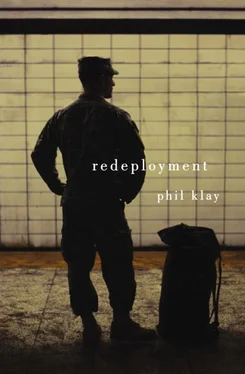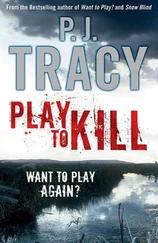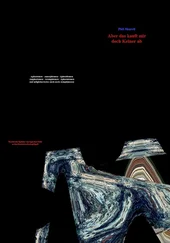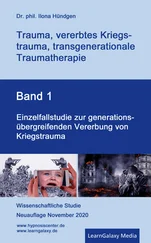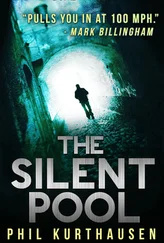“My father’s a deacon,” she said. “But he’s not a very good man. It took me a long time to realize that… .”
“And I… I was there because of him. When he hugged me and told me how proud he was of me—which he didn’t even do at my high school graduation—I took it in. Graduation from basic’s a big deal. All this pageantry. Uniforms and flags and everybody telling everybody over and over how brave we were, how patriotic, and what great Americans we were. You can’t resist hundreds of people feeling proud of you. You can’t. And then my dad, like it was just an offhand comment, he asks me, ‘So, when you signed up, why didn’t you pick infantry?’ and the feeling popped like a bubble.”
“What’d you do?”
“Nothing. I was in the Army now. I went to training. I got care packages from my mom and patriotic e-mails from my dad. He’d send me PowerPoints with pictures of soldiers, or jokes and speeches about ‘the troops’ that talked about them like they shat gold. I was eighteen, I ate it up. But I was also learning how to do propaganda in our classes, and it felt pretty fucking weird.
“We had one instructor,” I said, “who spent a class telling us about all the advertisement that went into us joining the Army and how dumb we were to fall for it. He’d say, ‘I love the Army. But how bullshit are those commercials?’ He was all about getting us to recognize the propaganda in civilian life so we could use the same techniques in war. He’d say, ‘Real life doesn’t fit on bumper stickers, so remember: If you tell too much truth, nobody will believe you.’”
“I don’t think that’s a good way to think about it.”
“Yeah, well, he’s right. In Iraq, we told a lot of truth and a lot of bullshit to the Iraqis. Some of the bullshit worked really well.”
“It’s strange to think of somebody doing that for a living,” she said. “You hear the word propaganda, it makes you think of those World War Two posters. Or Stalinist Russia. Something from another time, before we got sophisticated.”
“Propaganda is sophisticated,” I said. “It’s not just pamphlets and posters. As a PsyOps specialist, as anything in the Army, you’re part of a weapons system. Language is a technology. They trained me to use it to increase my unit’s lethality. After all, the Army’s an organization built around killing people. But you’re not like an infantryman. You can’t think about the enemy as nothing but an enemy. A hajji. A gook. A bad guy needing a bullet. You’ve got to get inside their heads.”
The night had come in force while we talked, and there was a full moon lying low in the sky. The streets were quiet. I felt close to her because she’d listened, and I’d told everything straight, pretty much, with a minimum of artifice. It made me want to go further, but that would require careful packaging.
“You know,” I said, “I lied to you before. A little.”
“How?”
“I did kill people.”
She was very still.
“I didn’t shoot anybody, but I was definitely responsible.”
The two of us let that hang in the air for a while.
“The last person I told this to was my dad,” I said. “It got me kicked out of the house.”
Zara looked down at her hands, folded in front of her, then up at me. She gave a little smile. “Well, I couldn’t get you kicked out of here if I tried.”
“And you sure have,” I said.
She shook her head. “It wasn’t a formal complaint,” she said. “My friends wanted me to make a formal complaint, but all I wanted was for you to have to listen. You’re not very good at that.”
“I’m sorry,” I said. “Truly.”
She shrugged. “Tell your story.”
“I was in the Battle of Fallujah,” I said. “We did a lot of crazy stuff there. We’d play shit just to fuck with the muj. Real loud Eminem and AC/DC and Metallica. Especially when they’d try to coordinate over their own loudspeakers. We’d play shit to drown them out, hurt their command and control. Sometimes we’d roll up to a position and play the Predator chuckle. You ever see that movie?”
“No.”
“It’s this deep, creepy, evil laugh. Even the Marines didn’t like it. We’d have something going on all the time. And the muj would play shit, too. Prayers and songs. There was one that cracked me up. It was like, ‘We fight under the slogan Allahu Akbar. We have a date with death, and we’re going to get our heads chopped off.’”
“Very poetic,” she said.
“It was horrible. There was gunfire and explosions and the mosques blaring messages and Arabic music and we were blaring Drowning Pool and Eminem. The Marines started calling it Lalafallujah. A music festival from hell.”
“In a city,” she said, “filled with people.”
“But it wasn’t just music,” I said. “The Marines, they’d compete to find the dirtiest insults they could think of. And then we’d go scream over the loudspeakers, taunting holed-up insurgents until they’d come running out of the mosques, all mad, and we’d mow them down.”
“Out of the mosques?” she said.
“You’re in this crazy city, death everywhere, and you see a lieutenant go to his men, as if it was the most serious thing in the world, and ask, ‘Do we go with, “You suck your mothers’ cocks,” or, “You fuck dogs and eat the shit of children”?’”
“Really? Out of the mosques?” she said again.
“Sure,” I said. “What? Are you kidding me?”
She shook her head. “So how did you kill people?” she said.
“The insults,” I said. “And of everything we did, that got the most satisfying feedback. I mean, the muj would charge and we’d listen as the Marines mowed them down. Sergeant Hernandez called it ‘Jedi mind trick shit.’”
“Okay,” she said.
“It’s brilliant,” I said.
“Unless your average schoolyard bully is brilliant,” she said, “it’s not. But I get why it worked.”
“Worked almost too well. We spent the next couple months trying to get the same fucks we’d riled up to stop charging because a lot of them were just teenagers. Marines don’t like killing children. It fucks them up in the head.”
“What’d it do to you?” she said.
“I feel good about what I’ve done,” I said.
“No, you don’t,” she said. “Or why are you telling these stories?”
“What are you?” I said, grinning. “My therapist?”
“Maybe,” she said. “That’s how this feels.”
“Fucking with insurgents saved lives at Fallujah. And then I probably saved lives afterwards, telling the truth about what would happen if you fucked with us.”
“So is that what got you kicked out of your father’s house? Saving lives?”
“No. Not saving lives.” I stopped, then started again. “It was over Laith al-Tawhid. If there’s one guy I killed, that’s the guy.”
Zara didn’t say anything. I picked up the hookah and pulled on it and got nothing. The coals were dead. I felt nervous, even though she’d been good to me. Patient. But if I kept going and told her the story, I didn’t know if she’d understand. Or rather, I didn’t know if she’d understand it the way I did, which is what I really wanted. Not to share something, but to unload it.
“When I got back,” I said, “there was no big ceremony. If you’re not part of a battalion, you come back on a plane with other cats and dogs, soldiers from different shops. I did my redeployment stuff, and then I went home.”
I looked down at my hands, then back up at Zara. I didn’t know how to tell her what coming home meant. The weird thing with being a veteran, at least for me, is that you do feel better than most people. You risked your life for something bigger than yourself. How many people can say that? You chose to serve. Maybe you didn’t understand American foreign policy or why we were at war. Maybe you never will. But it doesn’t matter. You held up your hand and said, “I’m willing to die for these worthless civilians.”
Читать дальше
